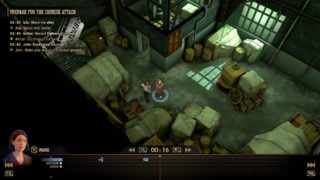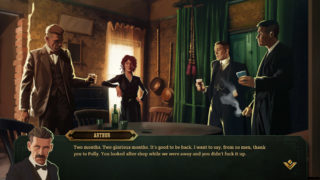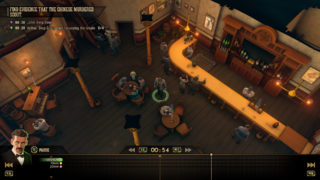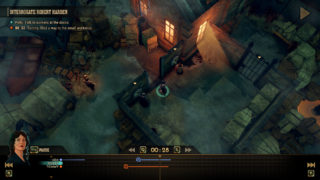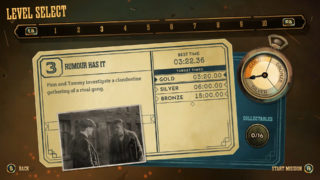Review: Peaky Blinders Mastermind is an inventive but lightweight take on the TV show
The BBC drama is transformed into an absorbing puzzle game
- Game director
- James Marsden
- Key Credits
- Sean Frisby (Lead artist), Toby Adam-Smith (Producer)

At times playing Peaky Blinders: Mastermind you could easily forget it had any connection to the hit BBC series.
It’s a throwback to a past era of licenced games, where you have to fill in a lot of gaps with your imagination. But adjust your expectations in line with its limited budget and beneath the shell is a clever puzzle game that at least partially captures the spirit of its source material.
Certainly, Mastermind doesn’t have a lot of the show’s drama, or dark grubbiness. Its zoomed-out view of post-World War I Birmingham has a generic historical feel, full of plain walls and offices, and NPCs made from indistinct bundles of period dress. Even the moody rock music, which fits stylistically with the original, lacks the imposing heft of its iconic Nick Cave theme tune.
The comic-book story scenes that sandwich each stage don’t offer much texture either, existing purely to advance a routine plot about gangland dealings and police corruption.
The likenesses of Cillian Murphy and the programme’s other main actors provide familiarity, but an absence of voiceovers robs them of personality. There’s also no space to explore the relationships between the Shelby family members – even Ada, who doesn’t always embroil herself with family business in the show, is merely another member of the gang – and bar a nod to the trauma of the war, there’s barely any social context at all.
While the TV series has its issues with characters and plotting, it always powers along with a sense of flair, and situates its fiction in the real-world struggles of its setting. Mastermind’s narrative is tame and superficial in contrast, like an issue of the Beano directed by Guy Ritchie.
Yet, perhaps recognising these shortcomings, developer Futurlab has shrewdly taken a lateral approach to the licence. Eschewing the obvious path of a crime empire simulator, Mastermind instead delivers an episodic puzzle game, in which the Shelby’s combine their talents to outwit rival gangs and police.
The ‘Mastermind’ of the title refers to Tommy Shelby’s aptitude for complex schemes that keep the Peaky Blinders one step ahead of their adversaries. In each mission, you control Tommy and some combination of the other five family members, Ada, Arthur, Finn, John and Polly (the game is set just before the first season of the TV show), as they meticulously execute these plans.
“While the TV series has its issues with characters and plotting, it always powers along with a sense of flair, and situates its fiction in the real-world struggles of its setting. Mastermind’s narrative is tame and superficial in contrast, like an issue of the Beano directed by Guy Ritchie.”
Every character has a unique ability, from distracting, bribing or intimidating NPCs to pick-pocketing, arson and brawling. You take direct control of them individually, moving in real-time through the streets and houses of Birmingham’s Small Heath, using these abilities to clear the way of obstacles.
But progress requires teamwork. The trick is that you can stop time, rewind and switch characters at any point, in order to synchronise their actions. Perhaps Tommy needs to move through the streets unseen, so you first position Ada to distract a sentry for a few seconds, then rewind to just before the distraction so you can guide Tommy through the danger area at the right moment.
In this way, Mastermind’s Small Heath becomes a strangely mechanical world full of one-way doors, remote locks, and policemen who wonder in predictable circles. But there’s something satisfying and even appropriate about these clockwork puzzles, as you deftly orchestrate the family members’ movements to unblock each other’s paths.

Level objectives break down into a sequence of micro-scenarios in which you cheekily get away with crooked behaviour by the skin of your teeth. Simple acts such as setting up a seamless distraction and pick-pocket manoeuvre, or even crawling through a window to unlock a door just as another character arrives on the other side, reward with their machine-like precision. And whenever the ends don’t meet, you rewind and refine until it all clicks into place like a jigsaw.
At the same time, there’s something very Shelby-like in the suite of actions at your disposal and the way the characters perform them. As in the TV show, brute force is no use without cunning and reputation, and the way Tommy and co stride calmly around the map, regardless of pressure, exudes a coolness and authority befitting their televised counterparts.
True, you won’t see any of the show’s trademark slow-motion shots of the gang strutting through the ironworks district with plumes of flame bellowing out behind them. Yet there’s a hint of that swagger when you extract your charges from the scene of a job well done.
“The last couple of missions are genuinely excellent interconnecting multi-part puzzles that deliver on the promise of the early stages. But they serve as proof that the rest of the game dawdles too long on mildly absorbing pursuits.”
Still, for all the ingenuity, the puzzles themselves are only sporadically taxing. For most of the game’s 10 missions, you’ll be juggling just two or three characters, with straightforward solutions based on the handful of abilities they possess. It’s only in the final two missions that Mastermind really flexes its design muscles, giving you control of five or six family members at once, to combine their skills in intricate patterns.
While it isn’t a very short game, then, too much of its runtime feels like a series of appetisers, showing you the ropes without fully loosening them. The last couple of missions are genuinely excellent interconnecting multi-part puzzles that deliver on the promise of the early stages. But they serve as proof that the rest of the game dawdles too long on mildly absorbing pursuits. Once it gives you something to really get your teeth into, it’s almost over.
There’s still a little mileage left after the credits in trying to get gold rankings on stages by executing plans with greater efficiency. But not much else. Hidden collectibles can be hoovered up with minimal effort, and hard mode only seems to remove waypoint markers, which are largely superfluous if you’ve already finished the game.
Mastermind is still original and engaging, but a few more variables and some additional challenges could have left a greater lasting impression.
Peaky Blinders: Mastermind is a clever and neatly crafted puzzle game that could do with some richer presentation and another layer of intricacy. Not quite a blinder, but worth a peek.
- Creative use of the licence
- Satisfying puzzles based on synchronising characters
- Lacks the atmosphere of the TV show
- Not complex or challenging enough until the end

